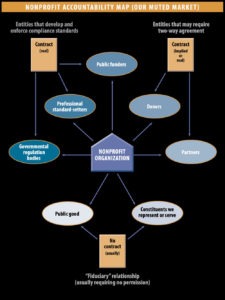June 6, 2011; Source: Wall Street Journal | If you turned on “Morning Joe” on MSNBC the other morning, you heard Joe Scarborough’s co-host Mika Brzezinski extol the Goldman Sachs program to create or assist 10,000 small businesses, a $500 million piece of the Goldman charitable commitment in 2009 after the firm’s embarrassment of riches in profits and bonuses during the recession.
Some may remember that Goldman Sachs hired former Clinton aide Mark Fabiani to think about charitable giving as part of the firm’s public relations response to public criticism, a “counter-narrative” strategy. The promotionals on MSNBC touting the 10,000 small businesses program, actually its first gathering of small business graduates at a fete with Warren Buffett joining Goldman’s Lloyd Blankenfein, may be part of the next phase of Goldman’s counter-narrative.
Despite Goldman’s PR-crafted philanthropic generosity, the firm has displayed some charitable instincts that may perplex NPQ Newswire readers. In April, a Senate subcommittee chaired by Carl Levin (D-MI) revealed that Goldman Sachs had been offloading its subprime mortgage exposure to clients as the market was beginning to tank, in other words, it was basically betting against the housing market including taking net short positions against the housing market of $10.6 billion on February 27, 2007 and $13.9 billion on June 25, 2007. In other words, philanthropy notwithstanding, Goldman played fast and loose with its own clients and the economy and played a major role in precipitating the national economic collapse. Curiously, it wasn’t the Obama Department of Justice or the Securities and Exchange Commission, but rather the Manhattan District Attorney that just issued subpoenas to get Goldman to come clean.
Sign up for our free newsletters
Subscribe to NPQ's newsletters to have our top stories delivered directly to your inbox.
By signing up, you agree to our privacy policy and terms of use, and to receive messages from NPQ and our partners.
The Goldman charitable pledge to small business looks pretty paltry, especially considering one odd potential recipient of the firm’s generosity. In 2008, the sovereign-wealth fund of Libya invested $1.3 billion with Goldman Sachs. Goldman helped the Qaddafi regime just about as much as it helped the U.S. housing market – it lost 98 percent of the value of the Libyan investment within two years. The Libyans weren’t happy, they went berserk. Goldman decided to try to mollify the Libyans by selling Qaddafi a $3.7 billion ownership stake in Goldman Sachs, which would have made Libya (or Qaddafi) one of the company’s top owners.
Blankenfein once characterized investment banking as “doing God’s work”, a characterization most people reserve for charity and philanthropy. Which part would God have blessed? Screwing investors and homeowners by shorting the housing market? Playing PR games with self-interested philanthropic commitments? Or harboring a charitable soft spot for the Qaddafi regime?—Rick Cohen













